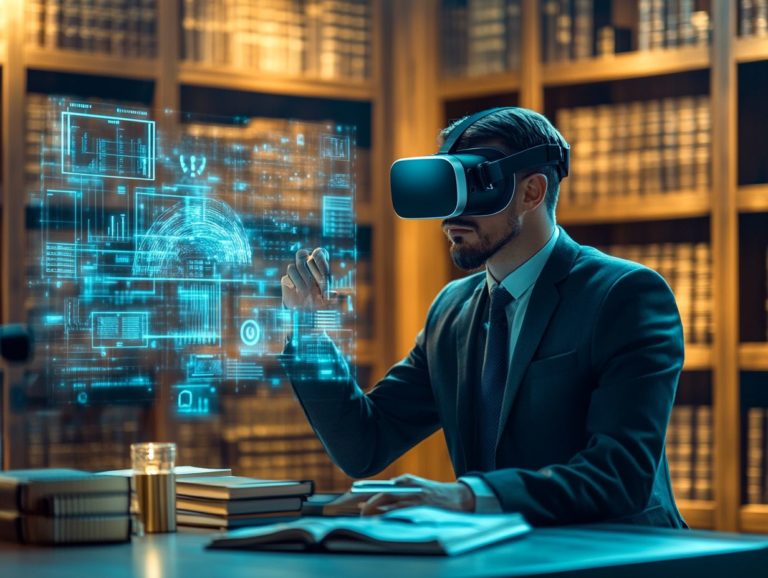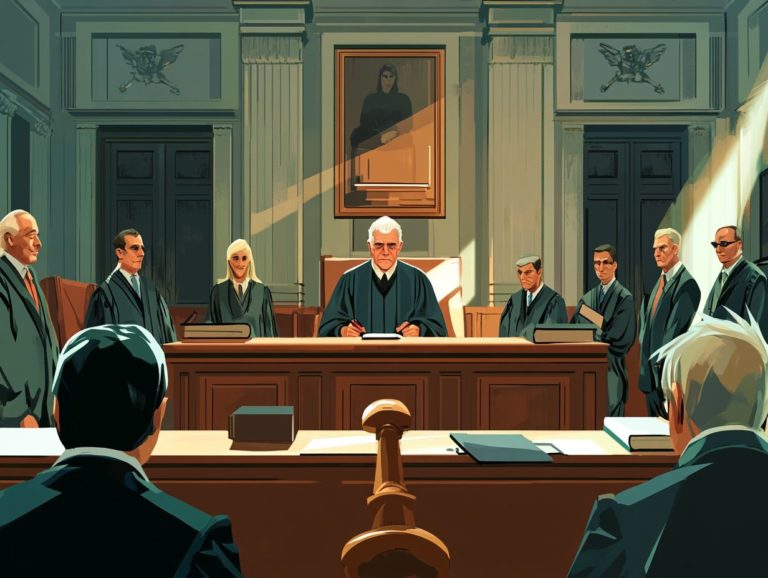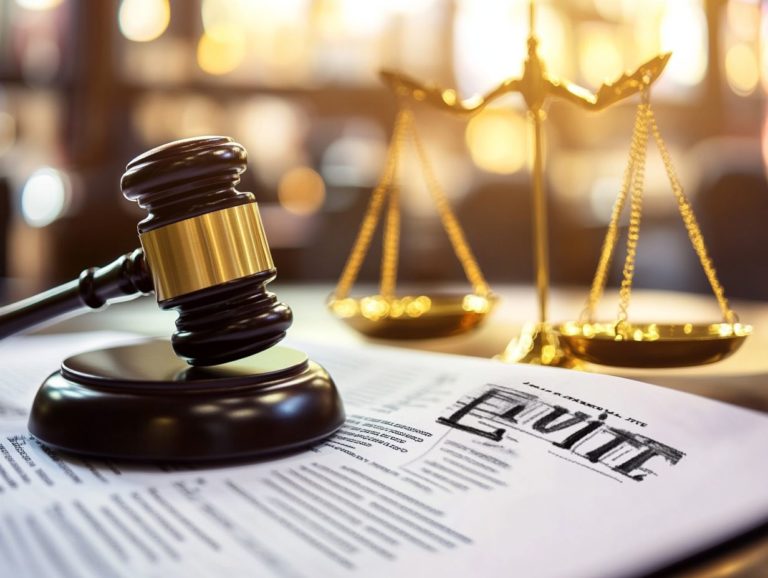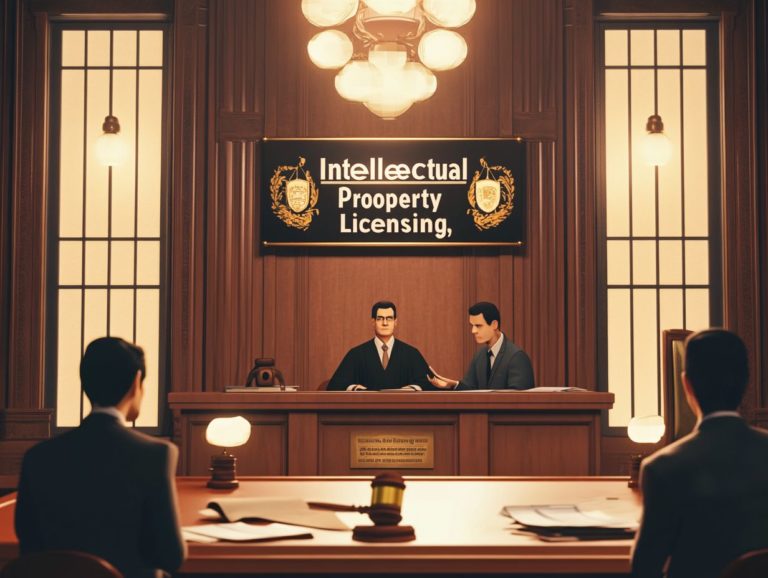Impact of Social Media on IP Litigation Cases
In today s digital landscape, social media has fundamentally altered not only the way you communicate but also how legal cases, particularly in intellectual property (IP) litigation, unfold.
As platforms like Twitter, Instagram, and Facebook become pivotal in evidence gathering, understanding their significance is essential for anyone embroiled in IP disputes.
This article delves into the ways social media is utilized in legal cases, the challenges it presents, and best practices for navigating this intricate terrain. It will also explore future trends that could reshape legal procedures.
Whether you re a legal professional or simply intrigued by the intersection of social media and law, you re in for some valuable insights ahead.
Contents
Key Takeaways:
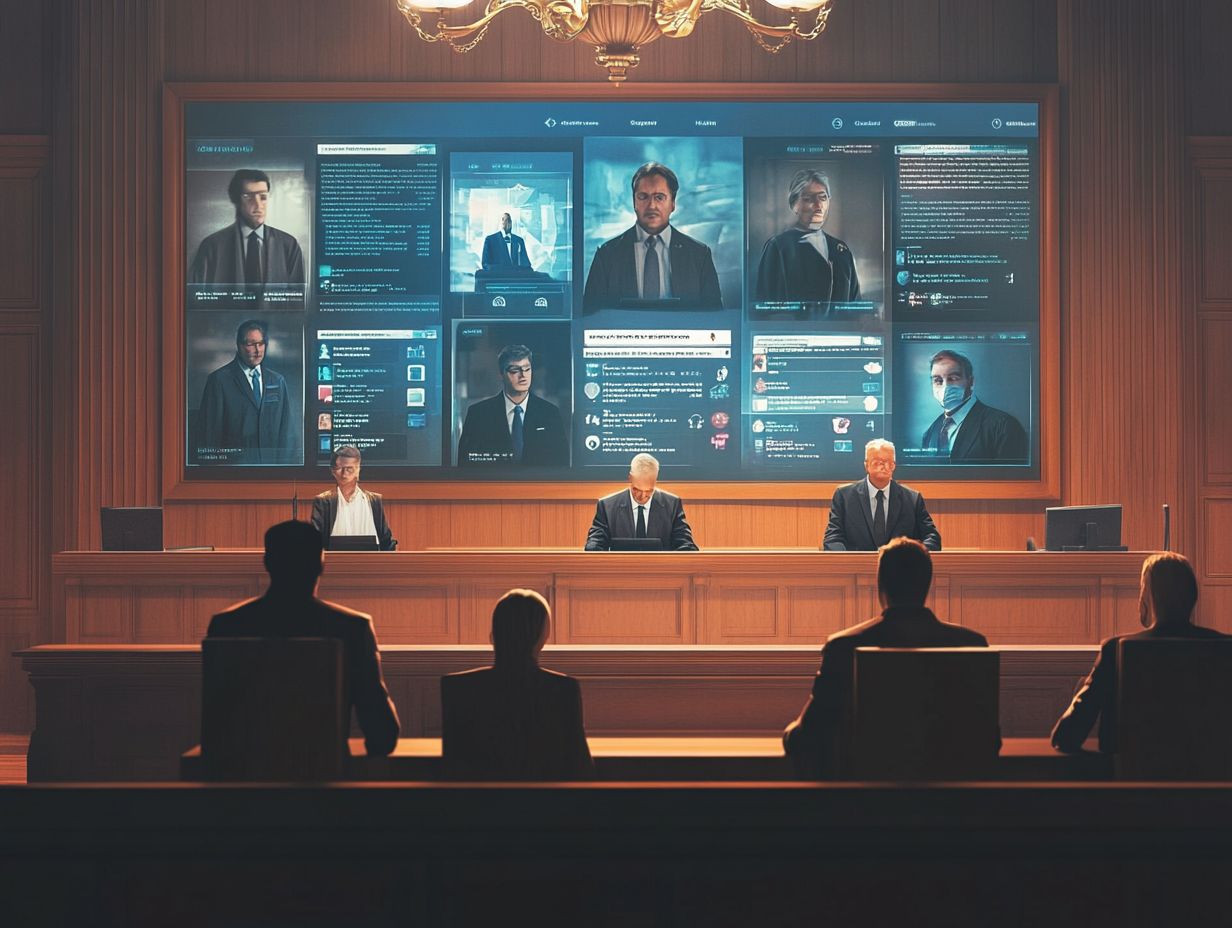
Social media is increasingly being used as evidence in online IP litigation cases, highlighting the need for legal professionals to understand its role and implications.
Challenges and risks, such as privacy concerns and the authenticity of evidence, should be carefully considered when using social media in IP litigation.
Best practices, including guidelines for collecting and presenting evidence, can help mitigate potential issues and ensure fair use of social media in IP litigation cases.
Defining Social Media and IP Litigation
Social media has woven itself into the fabric of modern communication, significantly impacting various realms, including the impact of social media on trademarks and intellectual property (IP) litigation.
With platforms like Instagram, Facebook, and TikTok gaining prominence, there s a double-edged sword: new opportunities for brand promotion alongside heightened risks of trademark and copyright infringements.
Esteemed brands such as Herm s and Samsung Electronics frequently grapple with intricate legal challenges when their visual content is used without permission.
Understanding the intersection of social media and IP litigation can offer valuable insights into brand recognition and consumer behavior, often leading to confusion in trademark disputes, particularly regarding the role of technology in modern IP litigation.
Role of Social Media in IP Litigation Cases
In the realm of IP litigation, social media emerges as an invaluable asset, serving as a distinctive platform for evidence gathering, especially considering the impact of digital transformation on IP litigation.
With user-generated content flourishing on platforms like YouTube and TikTok, you face the pressing challenge of safeguarding your trademark rights and brand identity.
These platforms allow you to track potential evidence of consumer confusion, offering critical insights into how unauthorized use of digital content can undermine your brand’s reputation and escalate the legal implications of trademark dilution.
How Social Media is Used as Evidence
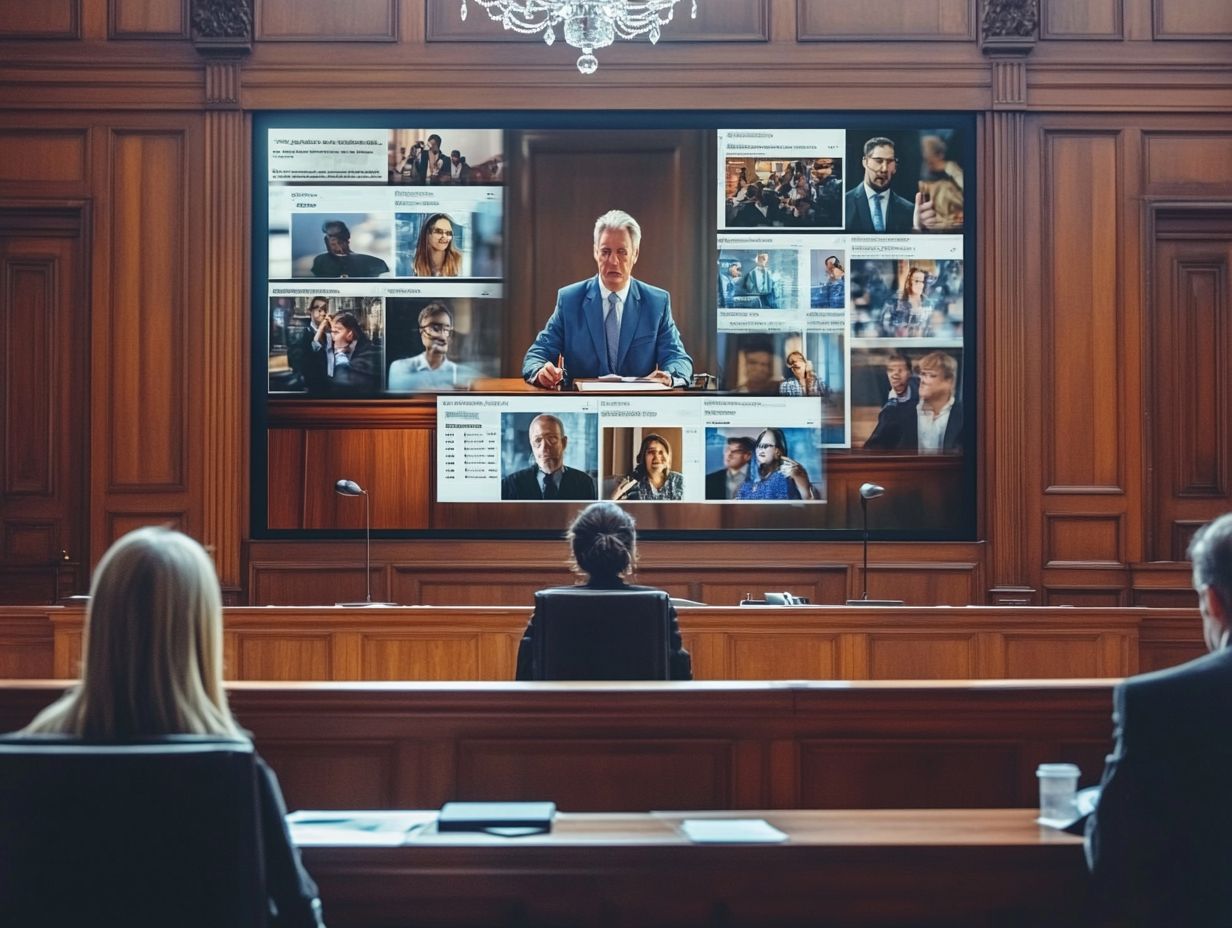
Social media acts as a critical resource in IP litigation, serving as a powerful tool to substantiate claims of actual consumer confusion, highlighting the influence of technology on IP litigation outcomes.
Legal standards often demand proof that a reasonable consumer might confuse one brand for another. Social media posts, comments, and engagement metrics can vividly illustrate this confusion.
Think about how employee behavior shared on platforms like Instagram might inadvertently contribute to brand dilution! If left unchecked, this could lead to significant legal repercussions for your company.
In many scenarios, you can capitalize on metrics tracking tools like Google Analytics or social media insights to gather quantitative data that bolsters your claims.
These tools quantify user engagement likes, shares, and comments making it easier to highlight patterns of confusion among consumers.
For instance, if a post featuring a competitor garners an unusually high engagement rate, it could suggest that consumers are mistaking one brand for another. Such solid data strengthens your case by providing a clearer view of how consumer perceptions evolve in real time, underscoring the necessity of continuous brand monitoring.
Start tracking your brand’s digital footprint today!
Impact on Case Outcomes
The impact of social media on case outcomes in IP litigation can be profound. Judicial rulings increasingly take social issues into account when determining trademark infringements.
As courts recognize the sway social media holds over consumer behavior and brand perception, the legal implications related to your cases evolve. This evolution can influence outcomes based on the strength and context of the evidence you present. Skillfully navigating the litigation process is essential.
Platforms like Instagram and Twitter have become crucial arenas for brand interactions. Recent case studies show how swift consumer reactions on these sites can sway judicial opinions.
In a notable trademark dispute, immediate support or backlash on social media shaped public sentiment and impacted the evidence presented in court.
The shifting legal landscape means you must monitor your online presence and strategically curate your digital strategies to mitigate potential risks. Remember, every post or comment could become a pivotal piece in future legal battles.
Challenges and Risks of Social Media in IP Litigation
Social media offers invaluable insights for IP litigation, but it also introduces a host of challenges and risks. You must navigate these with caution.
Privacy issues surrounding private accounts can complicate your evidence-gathering efforts. Not all content is easily accessible. The authenticity of evidence can face scrutiny, especially when you’re dealing with user-generated content that may not accurately reflect public sentiment or behavior.
This situation puts trademark rights at risk and heightens the potential for litigation.
Privacy Concerns
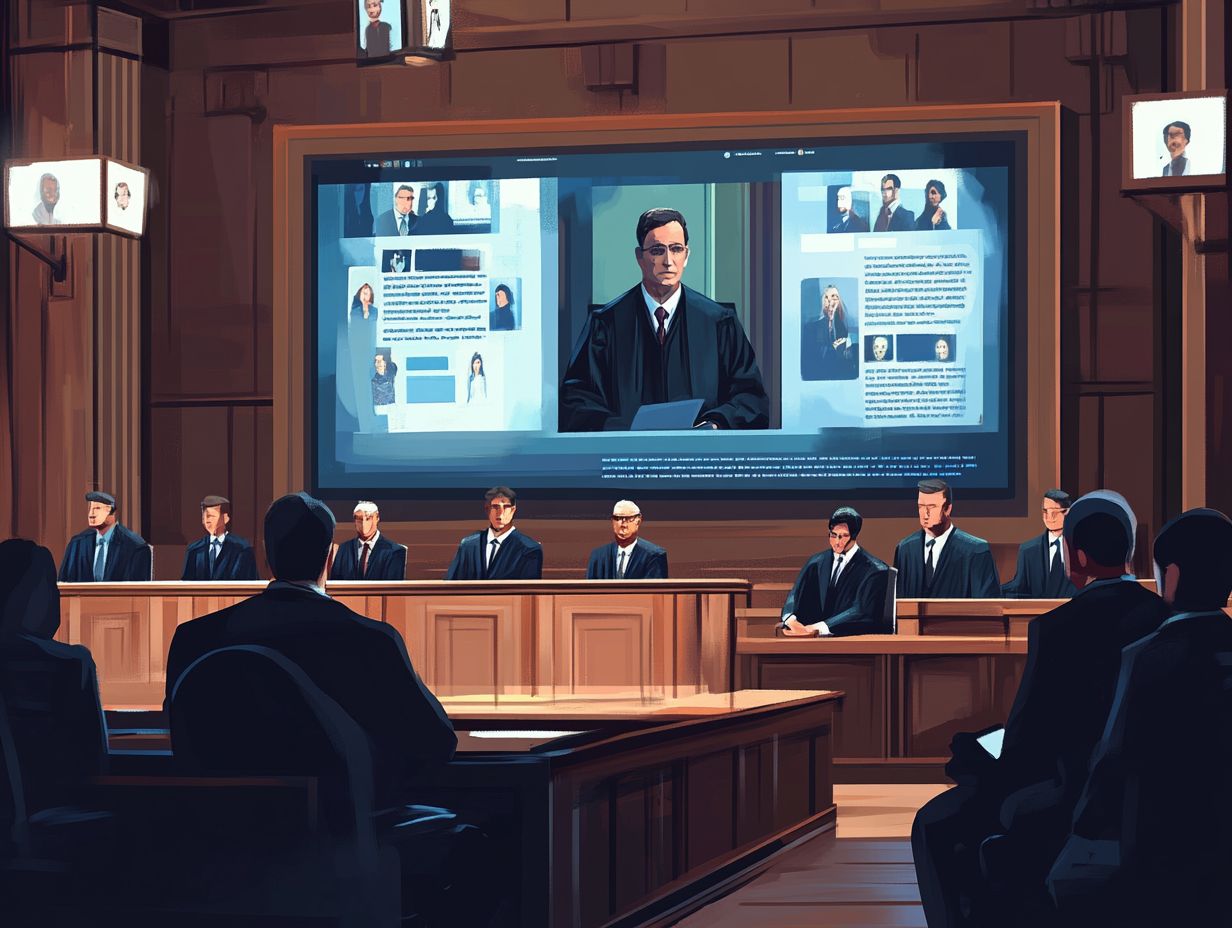
Privacy concerns are pivotal in social media and can significantly impact IP litigation cases. When you encounter private accounts on platforms like Instagram and Facebook, access to crucial evidence such as instances of trademark infringement or unauthorized use may be severely restricted.
This limitation creates significant legal implications regarding how brands can monitor their intellectual property and collect evidence from social media. Brands often find themselves in a delicate position, striving to assert their rights while also respecting user privacy.
To navigate these challenges effectively, companies should stay proactive with monitoring strategies. This may involve leveraging public profiles and using appropriate legal avenues to request access to private content when necessary.
Use social media monitoring tools to find unauthorized usage while respecting privacy. The legal landscape requires brands to remain compliant with data privacy regulations while gathering evidence. Striking a careful balance fosters both consumer trust and robust brand protection.
Authenticity of Evidence
The authenticity of evidence gathered from social media often faces scrutiny, complicating your IP litigation cases. Legal standards demand that any evidence presented in court must be credible and checkable.
This becomes challenging when you deal with user-generated content that might have been altered or taken out of context. It’s vital to adhere to ethical practices in evidence gathering. This not only maintains your brand’s reputation but also ensures the content used in litigation is relevant and trustworthy.
To successfully navigate this complex landscape, adopt thorough verification methods. Utilizing technology to capture timestamps and geolocation data can significantly enhance the integrity of your evidence. Taking screenshots with metadata and preserving unaltered copies of original content fosters transparency.
Moreover, consider the context in which the evidence was generated to ensure it aligns with applicable legal frameworks. By prioritizing these best practices, you strengthen your claims and uphold ethical standards in the ever-evolving realm of digital communication.
Stay vigilant in your monitoring efforts your brand’s future depends on it!
Best Practices for Handling Social Media in Intellectual Property Legal Cases
Implementing best practices for managing social media in intellectual property legal cases is crucial for effective evidence collection and safeguarding your brand.
Establish comprehensive social media policies that guide employee behavior to address concerns related to copyright protection and trademark infringement.
Use tools like Hootsuite and X1 Social Discovery to track brand mentions. This helps you respond quickly to legal challenges.
Guidelines for Collecting and Presenting Evidence
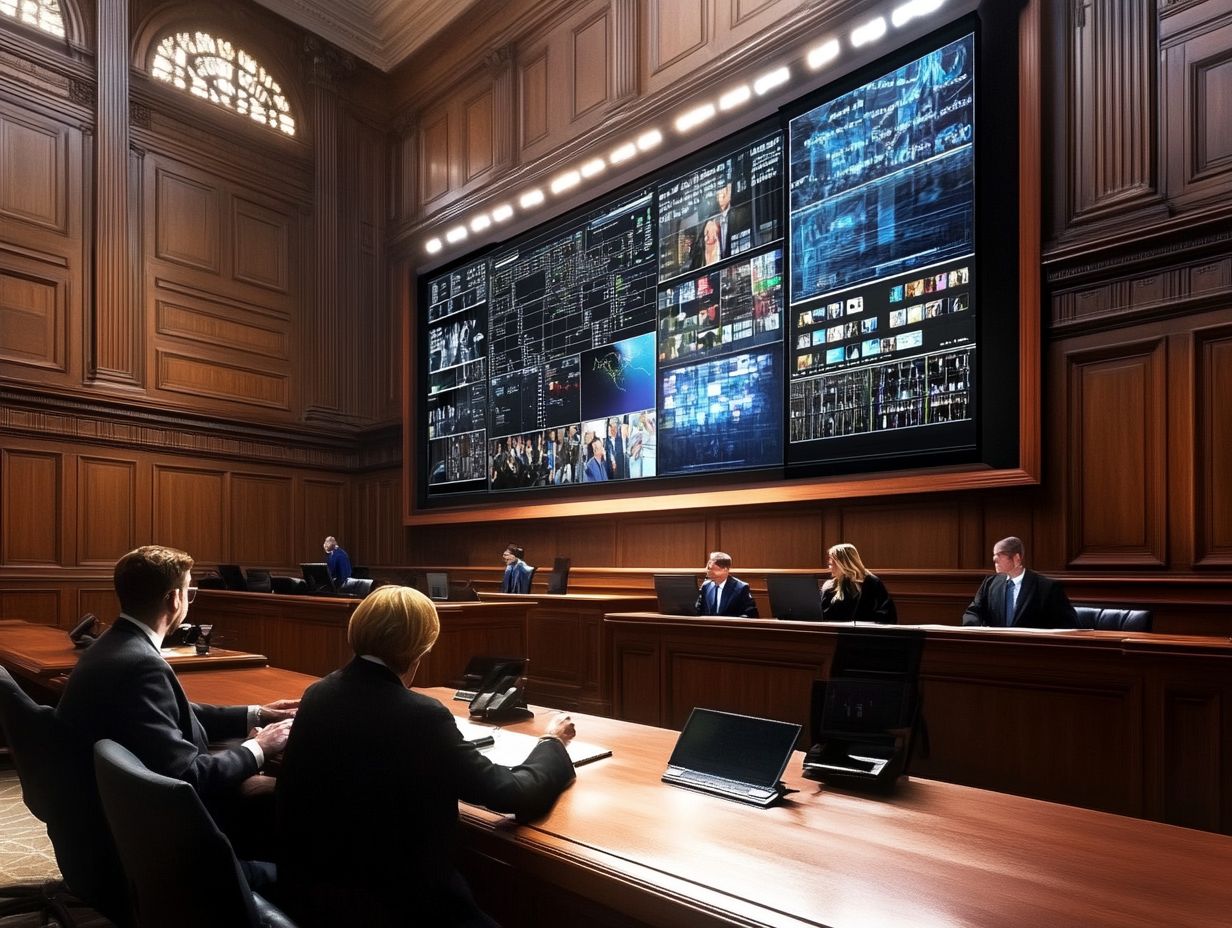
Establish clear guidelines for collecting and presenting social media evidence to ensure a successful litigation process.
Adhere to well-defined social media policies that detail how to gather digital records and effectively monitor user-generated content.
These practices are vital to keeping information accurate and relevant, minimizing the risk of legal challenges.
Develop a systematic approach to identify key dates, user interactions, and engagement metrics. Prioritize context with each piece of content, as surrounding circumstances can drastically influence interpretation.
By incorporating clear social media policies, you can create a cohesive strategy that guides your team in handling potential evidence. This fosters a culture that recognizes the critical nature of digital documentation and its role in protecting your brand’s integrity.
Future Implications and Trends
The future of IP litigation is poised to be profoundly influenced by emerging trends and technologies in social media, significantly impacting the role of social media in international IP law and altering legal procedures in ways previously unimagined.
As these platforms evolve and user engagement soars, the methods for gathering and presenting evidence will inevitably transform.
To effectively navigate the intricate landscape of trademark rights and copyright protection, remain proactive and adaptive to these changes. Ensure compliance with ever-evolving legal standards.
Potential Changes in Legal Procedures
Anticipating potential changes in legal procedures related to social media is essential for brands navigating trademark rights.
Courts are likely to rely more on social media evidence in IP cases, which means adapting your strategies accordingly is crucial.
As legal standards evolve, staying vigilant is key to ensuring compliance and protecting your intellectual property from unauthorized use and infringement.
This shift could lead to stricter scrutiny of online activities, where user-generated content takes center stage in legal disputes.
Stay ahead of the game by implementing strong monitoring systems that track mentions and appropriations of your intellectual property across various social platforms.
Educating your employees about the potential legal ramifications of their online conduct could prove invaluable.
Fostering a culture of awareness helps mitigate risks associated with potential litigation and enhances your reputation. Position yourself as a proactive and responsible entity in an increasingly digital marketplace.
Emerging Technologies in Social Media and IP Litigation
Emerging technologies are changing social media and reshaping IP litigation. With new tools, you can track unauthorized use of your intellectual property easily.
Tools like X1 Social Discovery help gather evidence and protect your brand from infringement. Innovations like artificial intelligence sift through online data to spot potential infringements in real-time.
Blockchain technology is also gaining attention. It creates tamper-proof records of ownership, adding security for your brand.
By using these technologies, you can boost your ability to gather evidence and respond swiftly to threats on social media. These advancements create new ways to defend your intellectual property rights effectively.
Frequently Asked Questions
Here are some common questions about the role of the internet in IP litigation and its impact on intellectual property.
What is the impact of social media on IP litigation cases?
Social media serves as a primary source for obtaining evidence related to IP infringement.
How has social media made it easier to gather evidence?
Users share information, images, and videos on platforms like Facebook and Instagram, which can be used as evidence in IP cases.
What are the challenges of using social media as evidence?
One major challenge is proving the authenticity of evidence. It can be tough to show that it hasn t been tampered with.
Can social media posts be used as evidence?
Yes, but it s essential to properly authenticate the posts and follow court rules for evidence.
How has social media impacted the resolution of IP cases?
It has made gathering evidence easier but has increased complexity due to the potential for manipulation of content.
What precautions should be taken when using social media as evidence?
Preserve evidence, authenticate it, and follow legal rules. Be aware of privacy laws and seek user consent if needed.
Stay informed and proactive in protecting your creative assets!

